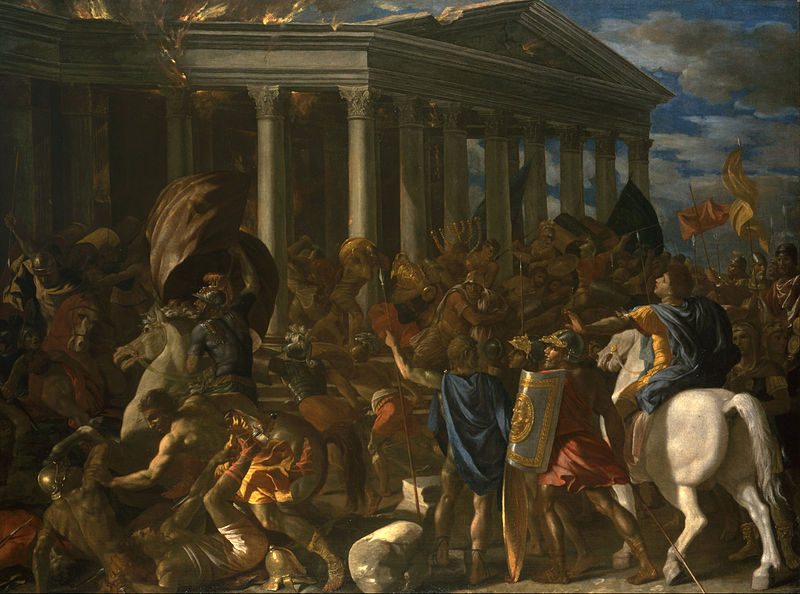
Nicolas Poussin’s Painting: The Destruction and Sack of the Temple of Jerusalem
One aspect of world missions is the challenge of missionary mobilization. Let me introduce you to a complicated set of these challenges from the sixth century before the birth of Christ.

Jean Fouquet’s Painting: Cyrus II le Grande et les Hébreux
The year was 520 b.c. The people of God were engaged (mostly not, as it turns out) in a particularly challenging stage of their missionary sojourn in the world. In 721 b.c. the northern tribes were overcome by the Assyrians and dispersed to the far corners of the world. In 586 b.c., the southern tribes were overcome by the Babylonians, who destroyed Jerusalem, razed the Temple to the ground and took the people of God into captivity for the better part of a century.
Yet in 539 b.c., God “stirred up the spirit of King Cyrus of Persia” (Ezra 1:1), now sovereign over the lands of Babylonia. The king released God’s people from their captivity. He charged them to return to their homeland and rebuild the Temple destroyed by Nebuchadnezzar before. In 538 b.c., a first wave of returnees arrived in Jerusalem. They set about their commission almost immediately.
“In the second year after their arrival at the house of God at Jerusalem, in the second month, Zerubbabel son of Shealtiel and Jeshua son of Jozadak made a beginning, together with the rest of their people…And all the people responded with a great shout when they praised the Lord, because the foundation of the house of the Lord was laid.”
— Ezra 3:11, NRS
The Temple!
This was a wonderfully challenging stage in their missionary sojourn in the world. You might imagine God’s people delighted to rebuild his Temple. And they were!
At first.
And then they simply laid the work aside. The mission that once filled their imaginations simply went dormant. For 15 years or so, until Haggai and Zechariah appeared upon the scene. The year was 520 b.c. Talk about missionary mobilization challenges!
God’s people faced the challenge of too many good things to do.
The Challenge of Priorities
God’s people faced the challenge of too many good things to do. Imagine the monumental task before them upon their return to Jerusalem! The entire city lay in ruins—and not only the Temple. Basic infrastructure needed repair. Housing needed development. Fields needed planting. Wells needed dredging out. Everything needed attention at once, it must have seemed.
And all of these tasks were good tasks in their own right. Overcome with the enormity of tasks before them, God’s people set about building “fine new homes” here and there around the city: it would have seemed perfectly sensible (Haggai 1:2, MSG). “Let’s build something comfortable at home,” they must have reasoned, “before we get too busy elsewhere.” Who could argue with that? But they didn’t get far on the Temple of God.
“The people procrastinate,” the Lord complains. “They say this isn’t the right time to rebuild my Temple, the Temple of God.”
— Haggai 1:2, MSG
This sort of challenge continues to distract us. We have too many good things competing for our attention. We have houses to build, church steeples to paint and pews to recushion. The infrastructure of our lives requires attention—what could be wrong with that?
There is nothing wrong with that. The problem comes when painting and re-cushioning become priorities over God’s explicit mission in the world.
“How is it that it’s the ‘right time’ for you to live in your fine new homes while the Home, God’s Temple, is in ruins?”
— Haggai 1:3, MSG
The prophets preached priorities. Maybe the steeple will need repainting at some point down the road. But not to the exclusion of building the Kingdom of God.
The Challenge of Courage
God’s people faced the challenge of active opposition, as well. Rebuilding God’s Temple in Jerusalem was countercultural activity. It threatened the values, politics and religion of the surrounding nations—and they opposed it as best they could.
God’s people faced the challenge of active opposition.
“Then the people of the land discouraged the people of Judah, and made them afraid to build.”
— Ezra 4:4, NRS
And “the people of the land” would still discourage obedience to God’s mission. Giving one’s all for Christ and His mission is still counter-cultural activity. The prophets responded to the challenge with basic Biblical advice: take courage (Haggai 2:4-5, Zechariah 8:13,15, etc.).
This was more than a matter of will; you cannot muster courage, exactly. It is a matter of building the perspective of faith. “I will not fail you or forsake you,” the Lord promised Joshua. “Be strong and of good courage” (Joshua 1:5,6, RSV). “It is the Lord your God who goes with you,” the Lord promised His people.
And to the returnees in Haggai’s day:
“Take courage, all you people of the land, says the Lord; work, for I am with you, says the Lord of hosts, according to the promise that I made you when you came out of Egypt. My spirit abides among you; do not fear.”
— Haggai 2:4,5, NRS
The prophets preached the promises. Participation in God’s mission may upset the status quo, and will sometimes elicit opposition. But God’s people may take courage, and get on with their calling in spite of it. They’ve got the dependable promises of God to rely on.
The Challenge of Pining
Some of God’s people, it seems, remembered the glory of Solomon’s Temple before Nebuchadnezzar destroyed the city. This became a challenge for them, too.
“Is there anyone here who saw the Temple the way it used to be, all glorious? And what do you see now? Not much, right?”
— Haggai 2:3, MSG
What they saw was an unimpressive mountain of rubble, the unhappy product of Nebuchadnezzar’s war machines (Zechariah 4:7). What they remembered was the sparkling Temple of Solomon—”an exalted house,” “a place for [the Lord] to dwell in forever” (1 Kings 8:13). The contrast was so bleak, so overwhelming— it must have seemed hopeless to attempt reconstruction at all. How could they match previous glories? Why even try?

Rubble of the Temple of Jerusalem
This kind of thinking can become a deep challenge to missionary mobilization. We may pine for some ideal past or some imagined future. We may pine for other places, times or environments.
We go all nostalgic, sometimes, about our favorite missionary heroes or the impressive daring of bygone eras. People were different “back then,” we say.
Wrong.
In 520 b.c., the project of rebuilding seemed “a day of small things.” But the prophets saw beyond these modest appearances. Here, now—with the people and environment before your eyes today—this is the time and the place to build. “For whoever has despised the day of small things shall rejoice,” the prophets promised. Zerubbabel the “small things” governor laid the first stone; but he will lay the top stone, too (Zechariah 4:10).
The mission of God doesn’t depend upon our strength, after all. It didn’t depend upon the strength of our old missionary heroes, either. “Not by might, nor by power, but by my spirit, says the Lord of hosts” (Zechariah 4:6).
God invites us into His building program, for His purposes—fueled by His power and grace, not our own. Missionary mobilization gets nowhere without this perspective. You may think that your life and possibilities are “small things”—and in one way, of course, they are. But if you look with the eyes of faith, you will see the raw material of God’s wonderful mission in the world. We must not pine for another place or a different time to obey.

Ancient Jerusalem compared to modern Jerusalem
The Challenge of Rudderlessness
God’s people faced the challenge of rudderlessness—still a common malady today. They were the chosen of God for the mission of God in the world. They were heirs to His calling, bearers of His promises, and instruments of His wonderful Kingdom. They were the children of Abraham, called to be a blessing to all the peoples of the world (Genesis 12:1-3). But they didn’t seem to know it. They had lost their rudder.
God’s people had developed the custom of “stopping their ears” and “turning a stubborn shoulder” to God’s direction (Zechariah 7:11). They “made their hearts adamant in order not to hear the law and the words that the Lord of hosts had sent by his spirit through the former prophets” (v.12).
This is what made their “fine new homes” so dangerous (Haggai 1:3). They began to live for their fine homes—unguided by the rudder of God’s mission in the world. They came to think that “fine new homes” were all there was to life. Their lives floated along at the surface of things—dragged by the currents this way and that, simply adrift. They needed to rediscover their place in the story of God’s mission in the world. They needed a rudder.
So do we.
There is a deeper current than the surface eddies that swirl us about. We are Abraham’s children also (Galatians 3:7). We, too, are called to be a blessing to all the peoples of the earth. We are called to announce the wonderful news of Jesus. We are called to make disciples everywhere we go (Matthew 28:18-20).
We need to build a perspective of faith.
Summary
So here is a strategy for missionary mobilization, rooted in the sixth century B.C.
Preach priorities.
Keep first things first. Don’t cushion your pews until you are making disciples of the nations as well.
Preach the promises.
We do not overcome our fears by scolding or harangue. Take courage for mission by leaning on the promises of God.
Preach practical obedience in “the day of small things."
Don’t pine for something better or wallow somewhere in the past. Demonstrate missionary obedience in the here and now, today.
Preach the rudder of God’s wonderful Kingdom.
Demonstrate a well-ruddered life yourself. You are a part of the story of God’s mission in the world. Act like it.
Preach Jesus.
There is no longer a temple to build in Jerusalem. Jesus is now our great High Priest (Hebrews 3:1). And He is building His temple with us (1 Peter 2:4-5).
This article first appeared in the September/October 2014 issue of Connections magazine. Reprinted by permission from author.
Want more info?
- Email the author.
- Like this article? Share it using the social media buttons below.
- Want a print copy? Click the printer icon below.
- And please rate the article!






